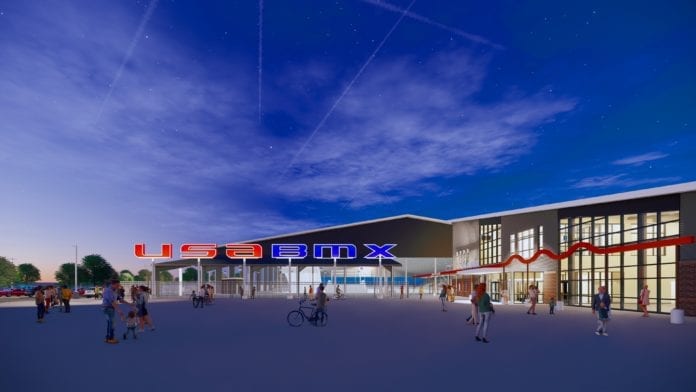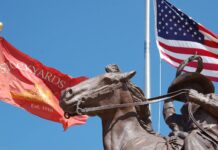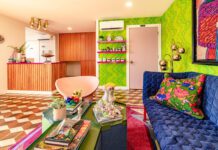
The timeline for construction on the National BMX Headquarters in Tulsa has looked like a BMX dirt-track race itself: loaded with jumps, berms and rollers. The project has been beset with delays, including negotiation breakdowns in 2017 and the change of the construction site from Expo Square to the current Evans-Fintube location north of downtown. Then, a few months after ground was officially broken – lifting hopes that the 2020 BMX Olympic trials would come to town – the pandemic arrived.
This perfect storm of setbacks seemed like a bike chain slipping out of its sprocket, but according to Tulsa Mayor G.T. Bynum and USA BMX Foundation chairman Shane Fernandez, the project has jumped all obstacles and is on schedule to open in late 2021.
Bynum confirmed in late October that the project has not experienced any significant impact on schedule due to the pandemic.
“We have seen a slight extended schedule on the steel, pre-engineered building deliveries due to an influx of projects being awarded during the peak COVID-19 times,” he says.
Fernandez says the construction team has been “excellent in setting up COVID safety protocols and ensuring a safe job site. Nabholz Construction, Todd Architecture, Wallace Engineering and the city of Tulsa have all done an excellent job in keeping things rolling and pressing forward.”
We have already found that USA BMX will be an incredible partner to the city.
USA BMX announced a few years ago that it would expand its Gilbert, Ariz., headquarters and move its museum and hall of fame from Chula Vista, Calif., to Tulsa. The USA BMX team that coordinates national races and memberships will remain in Gilbert. The headquarters will expand to include marketing and branding in addition to other BMX programs.
In April 2016, Tulsa voters approved $15 million for the construction of the BMX facility as part of the Vision Tulsa sales tax package. The project was born from a partnership between the city, Tulsa Parking Authority and the Hardesty Family Foundation. Together, they provided an additional $8 million in funding.
USA BMX’s new $23 million home includes the national headquarters, a hall of fame museum, the 2,000-seat Hardesty National Track Stadium and a 300-space parking lot. It’s all being constructed on the north end of the 22.3-acre Evans Fintube site on North Lansing Avenue in the Greenwood District. The city and USA BMX signed a 30-year lease agreement with two 10-year renewal options. The facility is expected to be the site for more than 100 local, state and national events in the first five years, generating nearly $11 million in economic benefits, the city announced.
“We have already found that USA BMX will be an incredible partner to the city,” says Bynum.
BMX officials say the facility will be more than a potential Olympic trial venue; USA BMX is formulating plans to work with at-risk youth who will benefit from using this facility, along with activities that will directly engage the community, Bynum says.
“Our team can’t wait to bring global talent and energy into our diverse downtown, engage our community with STEAM and mentorship programs, and elevate the overall brand of Tulsa as a global destination point,” says Fernandez.
Reaction from Oklahoma-based racers has been positive. Bynum says he was an avid bike rider as a kid, but never took part in any BMX racing.
“I am excited for this generation of Tulsans to have the opportunity to grow up with an Olympic sport in their city,” he says.
























